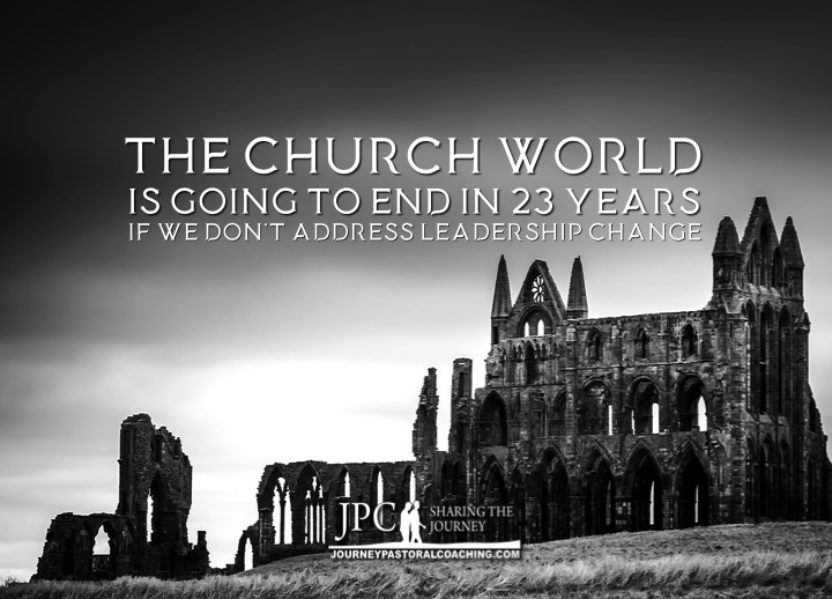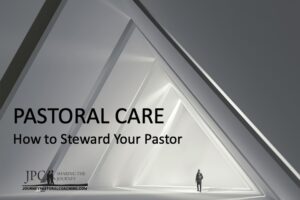The End of the Church?
Yes, you read correctly: the church world will end just 23 years from now – the year 2042.
That’s what the current studies and literature are saying. You just have to know how to interpret the studies and read the literature.
Actually, no, the studies do not say the church world will end in 23 years.
But the literature does say that church world will have to radically shift by that time.
Or hard world reality will radically shift the church.
Let me explain.
Church Leadership is Aging. Rapidly.
As I am credentialed with the Assemblies of God, I’ll use the AG as a point of reference in describing an issue that crosses all denominational lines in America.
- In 2000, the average age of an ordained AG minister was 55 years old.
- In 2017, it was 60 years of age;
- In 17 years, the average age increased by 5 years (9%).
This means that the average age of an ordained AG minister is currently increasing by one year about every 3.5 calendar years.
If the current rate continues, the average will reach retirement age (67.5) in 2042, just 23 years from now. The average age. Yes, there will be ordained ministers who are younger, but there will also be many who are older – some of these will actually retire while some will remain active.
Again, at the current rate, just 23 years from now, the average age of an ordained AG minister will be deep into the AARP years.
That means the average age of an ordained AG minister will reach retirement age in just one generation.
Or put it this way: by the time your son or daughter born today graduates from college, the average ordained AG minister will be ready to retire.
Let that really sink in.
WHAT ABOUT YOUNG MINISTERS?
“Well,” you say, “That’s true, but I see there are three levels of AG ministry credentials: Certified (Entry level), Licensed (Intermediate level), and Ordained (Evidence of a lifelong call to vocational ministry). Won’t young ministers who currently hold the first two levels of credentials eventually move up to the Ordained level?” Good question.
But whether they do or not, remember that the average ordained age increased by five years between 2000 and 2017: even if younger ministers are moving up to advanced credentials, ordained ministers as a group are still growing about one year older every 3.5 calendar years.
A second factor to consider: the number of all credential holders (Certified, Licensed, and Ordained) who are under the age of 40 (U40s):
- In 2000, 26.2% of all credentialed AG ministers were U40s.
- In 2017, that percentage stood at 20.8%.
- This represents a net loss of 5.4% in 17 years in U40s.
AND THERE’S MORE
Between 2000 and 2017, The AG saw an 8% increase in the number of churches, but a 14.8% drop in the number of U40s per church: we have fewer young pastors available to pastor a growing number of churches.
During that same period, the AG saw a 25.7% increase in total adherents but a 33% decrease in the number of U40s per 100 adherents: we have fewer young pastors available to pastor a growing number of believers.
Meanwhile, like the gears of a clock, the average age of an ordained AG minister is increasing one year every 3.5 calendar years and will reach retirement age in just 23 years. In one generation. Before your newborn of today graduates from college.
If the rate between 2000 and 2017 holds true for the future, by the time the AG’s 60 year-old of 2017 retires just seven years from today in 2024, only 18.6% of all credentials holders will be under 40 years of age.
And if that rate continues unabated, by the time the average age of an ordained AG minister reaches 67.5 (retirement age) in 2041, only 13.2% of all credentialed AG ministers will be under 40 years of age.
THE LARGER PICTURE
Again, this issue is not unique to the Assemblies of God: it is an issue that plagues Protestant denominations in general.
The Barna Group (TBG) recently studied this issue and published their findings in early 2017 (You can access their article here). Their findings include the following:
In 1992, “the median age of Protestant clergy was 44 years old. One in three pastors was under the age of 40, and one in four was over 55. Just 6 percent were 65 or older.
In 2017, “Twenty-five years later, the average age is 54. Only one in seven pastors is under 40, and half are over 55. The percentage of church leaders 65 and older has nearly tripled, meaning there are now more pastors in the oldest age bracket than there are leaders younger than 40.” (The Aging of America’s Pastors, March 1, 2017)
TBG goes on to say that the aging of the pulpit has not happened overnight, but is an issue with roots that go decades deep:
“In 1968, 55 percent of all Protestant clergy were under the age of 45—that is, the majority of all church leaders were in their 20s, 30s and early 40s. In 2017, just 22 percent are under 45.”
1968. Forty-five. Fifty-five.
2017. Forty-five. Twenty-two.
IS IT TIME TO CALL 911?
If the church were a human body and our vital signs showed this kind of drop, doctors would dispatch the patient to ICU “stat,” as they say in TV dramas.
In that ICU, as doctors treated the patient, they would ask the obvious question: “What in the world led to this condition?” In their study, TBG found the following factors:
1. People are living longer, remaining active longer – ministers included;
2. More people are entering the ministry later in life (many as bi-vocationals);
3. There is an insufficient numbers of young adults entering the ministry;
4. The financial pressure faced by pastors;
5. The allure of entrepreneurship: young adults say they can “make a difference” without carrying all of the baggage required to work in the institutional church;
6. The lack of leadership development among Millennials and Gen-Xers;
7. The lack of succession planning among Boomers.
There is another factor: the large number of non-credentialed pastoral staff now serving churches. More churches are hiring staff members who are not credentialed and do not plan to seek credentials. Large numbers of these are bi-vocational, and so, in their view, since credentials are not essential to function, credentials are unnecessary.
A SIMPLE SOLUTION?
The apparent solution would be more young adults in vocational church ministry, but this step alone is insufficient for two reasons. Both are cited above by The Barna Group.
First, young ministers would still face great financial pressures. On entering the ministry, they would still face large student loan debt, the low pay of first and second positions, and the financial stresses of starting families with this high debt and these low salaries.
Second, young ministers would still require development after they enter the ministry (every generation does). Every new minister still needs hands-on coaching-mentorship (the Bible tells us so).
Unless the church adequately addresses these two significant factors, a large influx of new ministers would be meaningless.
Ministries like PastorServe tell us that five of ten new ministers leave the ministry in their first five years – recruit two new ministers and only one will still be standing five years later.
The Schaeffer Institute found in a twenty-year survey that every Bible college and seminary graduate had at least one friend from school who had entered and subsequently left the ministry.
Meanwhile, the age clock continues ticking for those already in ministry.
WHAT CAN WE DO?
More and more we are understanding the essential nature of leadership development: not just technique-teaching on how to do pastoring, but coaching-mentorship in how to be a pastor – how to live the life required of a pastor, how our discipleship forms our pastoring, and how to allow doing to flow from being.
The Center for Creative Leadership writes,
“The most effective learning of all, more than all other forms combined, is going through hardship with support, and evaluation.
In their study, The Barna Group wrote:
“The bare facts of the matter are that even the wisest of older pastors is not here indefinitely, and his or her wisdom will be lost to the community of faith unless it is invested with the next generation.”
In other words, pastoral coaching and mentorship.
Coaching and mentorship are not the complete solution, but they are an essential part of the equation. Not only that the church will survive (because it most certainly will: the Bible says that Jesus will see to that), but so that we, the church will thrive.
For the glory of God, the strength of the body of Christ, and the salvation of those who are separated from Him.
___________________
NOTE: Journey Pastoral Coaching provides pastoral coaching to Millennial ministers.
Saddled with large student debt, just beginning to set up homes and start families, and serving in low paying first and second positions, Millennials are those who most desire but can least afford to pay for pastoral coaching.
So we offer it to them at NO COST: Our members do not PAY for coaching; they EARN it.
We are able to do so through the faithful and generous gifts of friends who want to see young leaders not only enter the ministry, but remain in the ministry. If you or your church would like to help Millennial ministers in 21 US states and 5 nations build strong for a lifetime in ministry, please click here to contact us by email or to support Journey monthly or with your one-time gift. Thank you.
We also invite you to click and subscribe to our twice-monthly blogs at journeypastoralcoaching.com
“In the early years when I was becoming a pastor, I needed a pastor.”
Eugene H. Peterson, The Pastor: A Memoir






